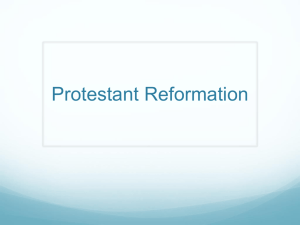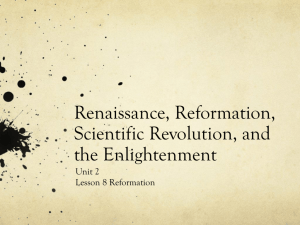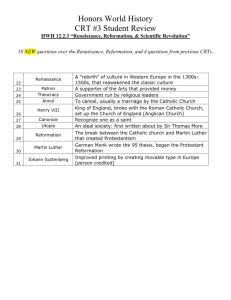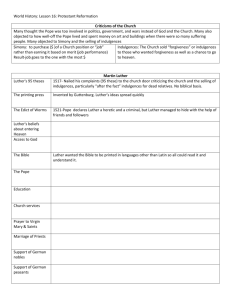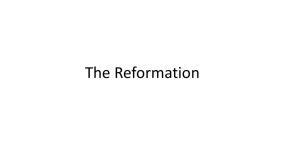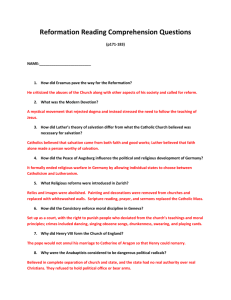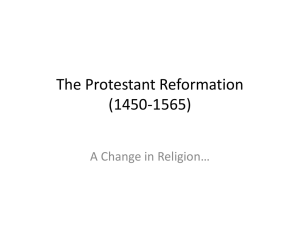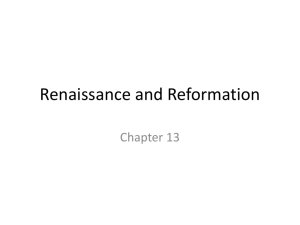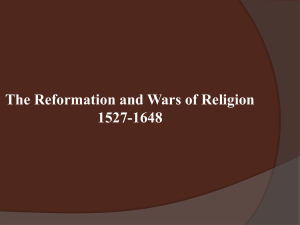Chapter 11, Lesson 3 The Reformation Begins
advertisement
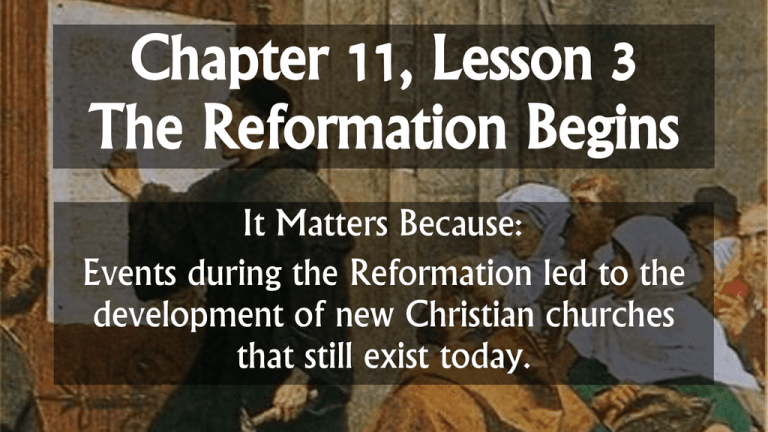
Chapter 11, Lesson 3 The Reformation Begins It Matters Because: Events during the Reformation led to the development of new Christian churches that still exist today. I. Calls for Catholic Reform A. Renaissance Europeans began to criticize growing wealth & power of Catholic Church 1. Martin Luther wanted to reform the Catholic Church 2. The Reformation instead led to new form of Christianity, Protestantism B. As early as 1300s, Europeans saw problems in the Church 1. Many bishops grew wealthy & built palaces 2. Many local priests could barely read C. Church began selling indulgences 1. Indulgence - certificate of forgiveness of sin D. People were angry about Church’s focus on money I. Calls for Catholic Reform E. 1370s, John Wycliffe believed everyone should be able to read the Bible 1. Translated Bible from Latin to English F. Christian humanists wanted to restore simple faith of early church G. Erasmus - best known Christian humanist 1. Believed people should use reason to receive faith 2. Believed Christians should be good in everyday lives, not just Sundays 3. This would reform church & society H. Erasmus wrote Praise of Folly to criticize Church corruption 1. Attacked wealth of church 2. Popes were so concerned with wealth & pleasure, they were no longer Christian II. Martin Luther A. Supported reform in Catholic Church, was opposed by Pope B. Became doubtful about Church after visiting Rome, seeing corruption there 1. Officials made fun of church rituals, disobeyed church rules 2. Became angry when Pope sent monks across Europe selling indulgences a. How could the church put a price on God’s forgiveness? 3. Prepared 95 arguments (Ninety-five Theses) against the church 4. Thousands of copies read across Germany II. Martin Luther C. Luther taughtonly Jesus was head of the Church 1. No man on earth or amount of money could save person from sin & hell 2. Christians could confess sin directly to God without priest D. Pope Leo X asked Luther to recant (deny) his statements 1. Luther refused, he was excommunicated E. Founded first Protestant Church, called Lutheran 1. Protestant – root word is protest; opposed Catholic practices III. Lutheranism & Politics A. Lutheran church based on 2 main ideas: 1. Faith in Jesus, not good works, provides place in heaven 2. The Bible is the authority for truth about God B. Peasant revolts swept across Germany 1. Luther supported peasants’ demands for higher wages, lower taxes C. Europe’s rulers supported Protestantism because it weakened Pope 1. As more states became Lutheran, less taxes paid to Pope IV. John Calvin A. John Calvin studied law, humanism, & religion in Paris 1. Agreed with Luther about Protestantism 2. Fled Paris when it became too dangerous to speak about Protestantism B. Calvin believed in predestination 1. Predestination - God decides outcome of all things 2. God decides who will go to heaven & who will not C. Calvin’s teaching led people to improve their behavior V. England’s Reformation A. Early Reformation in England was political - King Henry VIII vs. Pope Clement VII (Lorenzo de Medici’s nephew) 1. Henry wanted to divorce first wife, Catherine of Aragon (daughter of Ferdinand & Isabella of Spain) 2. Pope would not allow divorce, because he did not want to anger Catherine’s family 3. Henry divorced Catherine; Pope excommunicated him 4. Parliament made Henry head of the Church of England 5. Henry seized Catholic lands in England & gave it to nobles, ensuring loyalty VI. Bloody Mary & Elizabeth A. Church of England accepted some Protestant ideas 1. Kept most Catholic rituals B. Most English Catholics supported Henry’s Catholic daughter, Mary, when she became Queen 1. Mary I of England restored Catholic Church, arrested Protestants 2. More than 300 Protestants were burned at the stake 3. Many English turned against Mary, calling her “Bloody Mary” C. Mary died in 1558 & her sister Elizabeth became Queen 1. Elizabeth I restored Anglican Church, became one of England’s greatest rulers VII. The Puritans in England A. Some English became Calvinists, known as Puritans 1. Wanted to purify the Anglican Church (Church of England) of Catholic ways • Elizabeth tolerated Puritans • James I & his son, Charles I, felt threatened by Puritans 1. Closed churches, arrested leaders 2. Many Puritans left England, settled in N. America 3. Many settled in New England 4. One group, the Pilgrims, separated from Anglican Church & founded the Plymouth colony in Massachusetts
